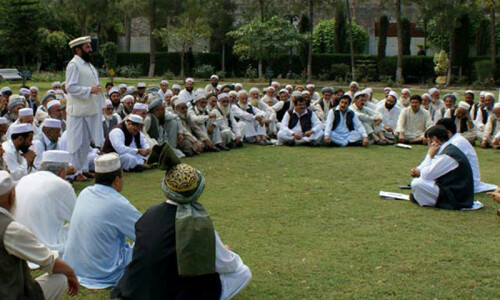PARIS: The world will miss its chance to avert climate disaster without an immediate and all-but-impossible fall in fossil fuel emissions, the UN said on Tuesday in its annual assessment on greenhouse gases.
The United Nations Environment Programme said that global emissions need to fall by 7.6 percent each year until 2030 to limit global temperature rises to 1.5C.
The harsh reality is that emissions have risen on average 1.5 percent annually over the last decade, hitting a record 55.3 billion tonnes of CO2 or equivalent greenhouse gases in 2018 — three years after 195 countries signed the Paris treaty on climate change.
The World Meterological Organisation said that atmospheric greenhouse gas concentrations hit an all-time record in 2018.
The Paris deal committed nations to limit temperature rises above pre-industrial levels to “well below” 2C, and to a safer 1.5-C if at all possible. To do so they agreed on the need to reduce emissions and work towards a low-carbon world within decades.
Yet the UN found that even taking into account current Paris pledges, the world is on track for a 3.2C temperature rise, something scientists fear could tear at the fabric of society.
Even if every country made good on its promises, Earth’s “carbon budget” for a 1.5-C rise — the amount we can emit to stay below a certain temperature threshold —would be exhausted within a decade. In its own words, the UN assessment is “bleak”.
While it insisted the 1.5C goal is still attainable, it acknowledged that this would require an unprecedented, coordinated upheaval of a global economy that is still fuelled overwhelmingly by oil- and gas-fuelled growth.
“We are failing to curb greenhouse gas emissions,” UNEP’s executive director, Inger Andersen, said.
“Unless we take urgent action now and make very significant cuts to global emissions we’re going to miss the target of 1.5C.”
The Emissions Gap report, now in its tenth year, also details the cost of a decade of government inaction.
Had serious climate action begun in 2010, just after the Copenhagen summit that breathed new life into the debate, annual needed emissions cuts would be 0.7 percent for 2C of warming and 3.3 percent for 1.5C.
“Ten years of climate procrastination has led us to where we are today,” said Andersen.
The report highlighted specific “opportunities” for big emitters to push their economies into line with the Paris goals.
While advice varies between countries, the theme is clear: completely phase out coal, significantly pare back oil and gas, and dramatically build up renewable energy.
G20 nations were singled out as laggards: although they produce around 78 percent of all emissions, only 15 rich nations have outlined plans to reach net-zero.
In all, countries must increase their contributions to the climate fight five-fold to deliver the cuts needed for 1.5C.
“Incremental changes will simply not make it,” said lead author John Christensen.
“We really need to transform societies in these 10 years.” Wendel Trio, director of Climate Action Network (CAN) Europe said 2020 needed to be a “major historical turning point” in the climate fight.
“The hope lies in millions of people taking to the streets, who can force politicians to act according to the recommendations from scientists,” he said.
Last year the Intergovernmental Panel on Climate Change — the world’s leading scientific body on the subject — issued a stark warning that going beyond 1.5C would increase the frequency and intensity of heatwaves, superstorms and mass flooding. With just 1C of warming so far, 2019 is projected to be the second hottest in human history, a year marred by deadly wildfires and cyclones rendered more frequent as temperatures climb.
Published in Dawn, November 27th, 2019














































